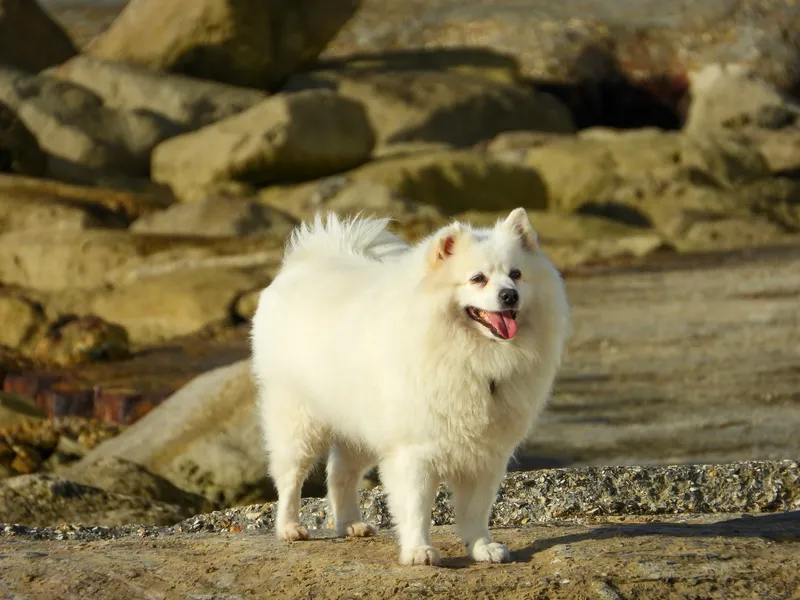Chinook

Description
The Chinook is a rare and versatile dog breed known for its strength and endurance. Originally developed in the early 20th century in New Hampshire, the Chinook was bred primarily as a sled dog, capable of working in harsh winter conditions. The breed is characterized by its friendly demeanor and strong work ethic. Chinooks are medium to large-sized dogs, displaying a balance of power and agility, making them excellent companions for active families and individuals.
Personality
Chinooks are known for their friendly and affectionate nature. They are often described as loyal, intelligent, and eager to please, which makes them highly trainable. Chinooks tend to get along well with children and other pets, making them a great addition to family life. They are also known for their playful spirit and high energy levels, which require regular exercise to keep them happy and healthy. While they are generally social and outgoing, they can be reserved with strangers, making them good watchdogs.

Care Requirements
Chinooks require regular exercise to channel their energy and maintain physical fitness; daily walks, play sessions, and mental stimulation are essential. They thrive in environments where they can be active, such as homes with large yards or access to outdoor activities. Grooming needs include regular brushing to manage shedding, particularly during seasonal changes. Chinooks are generally healthy dogs, but potential owners should be aware of specific health issues like hip dysplasia and certain genetic conditions. Regular veterinary check-ups, a balanced diet, and training are crucial for their overall well-being. Socialization from a young age is also important to ensure they grow into well-adjusted adults.
Suitable For:
- Families with children due to their affectionate nature.
- Households with other dogs as they are very sociable.
- Those who want a protective watchdog.
- People able to provide moderate amounts of exercise.
- Owners willing to invest time in training, as they are quite trainable.
Not Suitable For:
- People who are frequently visited by strangers, as Chinooks can be wary of unfamiliar people.
- Those who prefer a more playful and energetic dog.
- People living in apartments or noise-sensitive areas due to their high barking tendency.
- Those who are away from home often, as Chinooks crave companionship.
- First-time dog owners who aren't confident in training a dog, despite the breed's high trainability.
Physical Characteristics
Chinooks typically stand between 20 to 27 inches tall at the shoulder and weigh between 50 to 90 pounds. They have a strong, muscular build with a broad head and a thick neck. Their coat is medium-length, dense, and weather-resistant, often featuring a golden to tawny coloring, sometimes with dark markings. The breed has expressive brown eyes and erect or semi-erect ears that add to their alert appearance. Their tails are bushy and are typically carried over the back or to the side.
Height
Male: 24" - 26"
Female: 24" - 26"
Weight
Male: 55 - 90 lbs
Female: 50 - 65 lbs
Life Expectancy
12 - 15 years

Breed Profile
Breed Characteristics
Maintenance Requirements
Breeds Similar to Chinook
Based on temperament, size, and care requirements, these breeds share similar characteristics:
Frequently Asked Questions
Affiliate Disclosure: Pet Breed Hub participates in affiliate programs. We may earn a commission from qualifying purchases made through links on this page, at no additional cost to you. These commissions help us maintain this free resource. Learn more
Recommended Products for Chinooks
Fun Facts
The Chinook dog breed is a rare breed that was developed in the early 20th century by a man named Arthur Treadwell Walden in New Hampshire, USA. He aimed to create an exceptional sled dog breed, and the Chinook is known to be the result of a crossbreeding between a female husky used for sled dog racing and a large, mixed-breed male dog.
Physically, the Chinook is a powerful and athletic breed that possesses an impressive strength-to-weight ratio. Despite their robust size, standing 24-26 inches tall and weighing between 55-90 lbs, the breed is known for its agility and endurance, which made them ideal for pulling heavy loads across long distances in harsh weather.
One of the unique behaviors of the Chinook breed is its versatility and adaptability. They are not just sled dogs but also excel in obedience, search and rescue, agility, and therapy work. They are also known for their exceptional patience and gentleness with children and other animals.
The Chinook holds a notable achievement in the world of exploration. The breed played a significant role in Admiral Byrd's 1929 Antarctic expedition. In fact, Walden's lead dog, also named Chinook, was part of the team. However, the dog was lost during the expedition and his fate remains a mystery.
Despite their rich history and distinctive qualities, the Chinook was listed as the rarest dog breed by the Guinness Book of World Records in 1965. Today, dedicated breeders have saved the breed from the brink of extinction, but they remain a relatively uncommon breed. They were declared the official state dog of New Hampshire in 2009, further highlighting their cultural significance.



